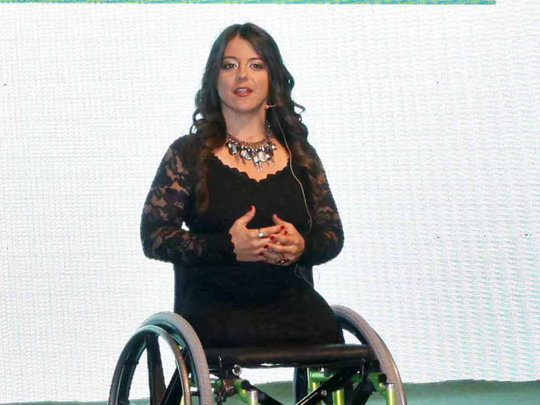
Abu Dhabi: Born without legs, and left at the hospital by her parents, not many people would have predicted a bright future for Jennifer Bricker.
Yet that’s exactly what happened, as she became an accomplished gymnast, and a public speaker going around the world and talking about her life experience.
Jennifer gave her inspirational story as part of ACCESS Abu Dhabi 2015, held under the patronage of Lieutenant General Saif Bin Zayed Al Nahyan, Deputy Prime Minister, and Minister of Interior.
For Jennifer, her disability didn’t keep her down or prevent her from living her life to the fullest, a story she is keen to tell and share. Speaking to the audience, she recounted how her adoptive parents’ upbringing played a major role in allowing her to live a normal life.
“They fought for my independence from day one, they didn’t just talk about it, and they lived it. They set that example so that I would have confidence, self-esteem, and courage. My parents never one time discouraged me from doing anything, if I said I want to play volleyball, softball, basketball, and gymnastics they said awesome we’re going to figure out a way to make it work for you, or let you figure it. They were creating my independent mind.”
Jennifer says she never thought she was any different to anybody else while growing up, and that she was just living her life, and never understood why people thought she was an inspiration.
“I literally had no idea that I was different, I was competing in several sports. I was on a lot of television shows, talk shows, and newspapers when I was younger. Everybody would come up to me and say you’re such an inspiration and you’re so amazing, and I was so irritated by that. I didn’t understand why they were saying that, my friend is playing softball, he is playing football, she’s a gymnast, why is it a big deal that I’m a gymnast?”
Support
The most important thing according to Jennifer is to support and encourage a disabled person to do what they want, rather than telling them they can’t, or trying to be too overprotective of them.
“Anybody can have a disability, but what my parents gave me was an ability, a mind to think for myself, to make me realise that I could do anything. And when you tell someone they can do anything, and you support it, then literally the sky is the limit.”
Jennifer would eventually meet her original biological parents, holding no grudges towards them, saying it was her destiny for the way things turned out. In another twist, her biological sister was Dominique Moceanu, a gymnast and gold winner, and someone she grew up idolising.
Fredrik Haren from Sweden shared the same sentiments when he delivered his talk, Haren who has a four-year-old autistic son, is the founder and director of Interesting Organisation, and has delivered more than 1,500 presentations in more than 55 different countries on the subject of people with disabilities.
“I could go to a banking conference tomorrow, or a car conference the day after tomorrow, and there is a very big chance we have someone with a disability who is speaking at this conference. Not because they are disabled, they [the organisers] are not doing that to be nice to them, they are doing that because they want the best person to come and speak to them, and a disabled speaker has a unique message that they want to get everybody to listen to. We think that we need to get them into the society, to be like everyone else, no they don’t.”
Haren emphasised that disabled people are unique and this should be encouraged. Giving an example of his son, he said. “When my son looks at railway tracks and says it’s not a railway track, it’s a landing place for an aeroplane. I’m not going to tell him he’s wrong, I’m going to encourage him to think differently, and so should you.”












